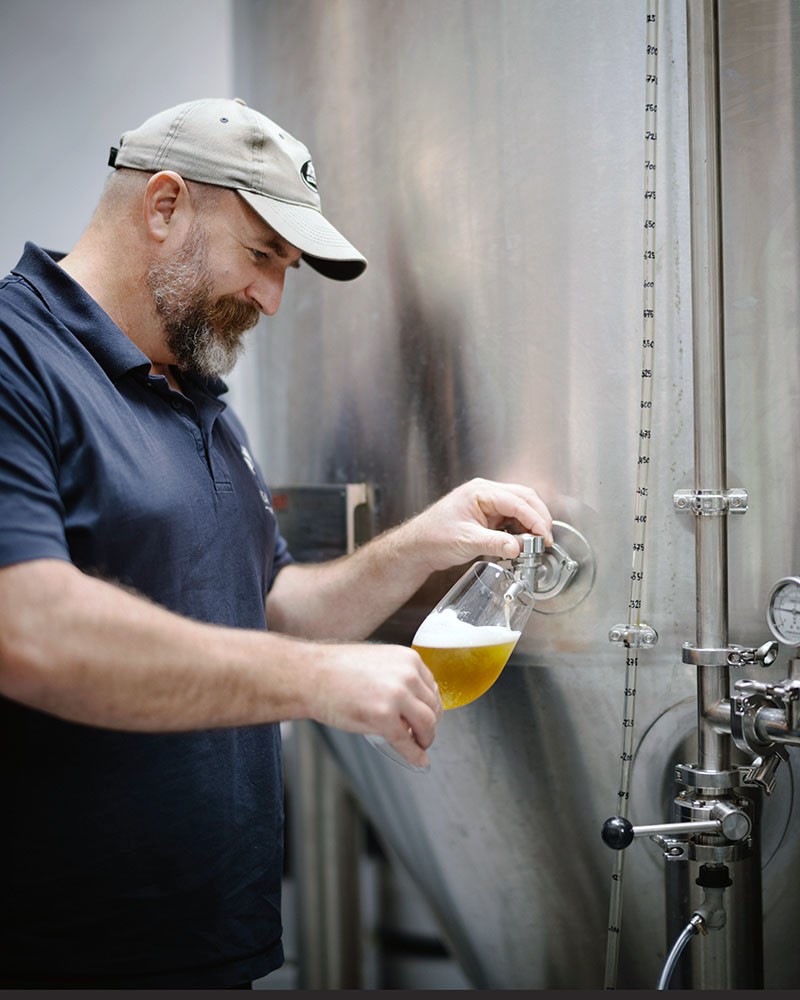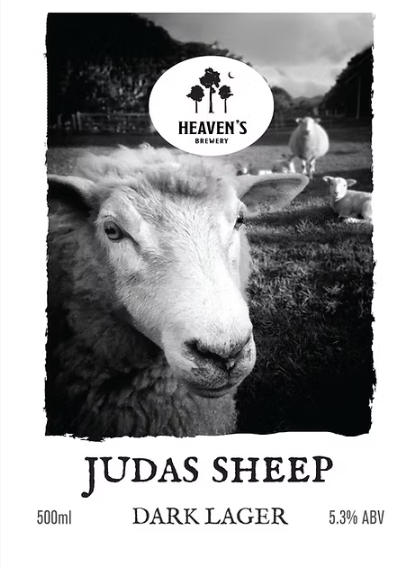When Heaven’s Brewing burst onto the national stage with a Top 25 at the New World Beer & Cider Awards, it seemed like they’d come from nowhere.
But I reckon anyone who tried their Judas Sheep Czech-style dark lager will appreciate this is no flash in the pan debut. In fact, it’s the opposite: founder-brewer Ben Heaven has been on a very slow burn.
Ben, his wife Jodi and their children, came back to New Zealand in 2015 after spending the first part of the century in England, where he also ran a small brewery.
“We came back to be a bit closer to my wife’s family,” Ben explains. “And the vision at that time was ‘right, if we’re going back to New Zealand, we’d really like to live in a more rural location rather than be tied to town’ and I would move away from doing research work to doing brewing.”
They bought a rural property in Marua Valley, near Hikurangi, inland from the popular Tutukaka Coast north of Whangarei.
“Jodi continued with her career and, bless her, was the breadwinner. And I looked after the kids and developed the land, built gates and troughs, and we bred Wessex Saddleback Pigs and had a small flock of sheep and built the brewery.
“But I was a bit naive. I didn’t realise how long it would take to build the brewery. It’s taken almost 10 years from an empty paddock to what we’ve got now, so it was quite a slow process. But we’ve got there in the end, we’ve got a functioning brewery.”
The long set-up time was, Ben admits, due to being risk-averse and not wanting to borrow money for the enterprise and therefore doing a lot of it himself.
It’s the second time he’s built a brewery, having previously built one in his garage, called Bondgate, when he lived in Hexham, Northumberland.

The garage was originally a studio for Ben’s other passion, photography, a skill he still uses for some of the artwork on his website and labels.
“But photography didn’t really work so well once we started having children, because you can’t be up at dawn taking shots of the sunrise when you’ve got kids at home. So, I fell back onto my previous interest of brewing.”
Not content to just home brew, he went semi-commercial, brewing cask conditioned real ale which he sold to local pubs and beer festivals in the local area.
“That was really the start of a kind of a commercial venture for me, but then it was on the side of my main job.
“There were lots of country pubs everywhere. So that was my bread and butter, if you like, selling to pubs and festivals.”
WHERE IT BEGAN
Ben’s original discovery of beer reminds a little bit of Richard Emerson’s story — he travelled to Scotland because of his father’s work and discovered a beer world unimaginable to a young New Zealander coming of age in 1980s Dunedin.
England-born Ben came to New Zealand with his family as a boy and it was journey “home” to England as a young man that opened his eyes.
“It starts in about 1998 when I was at Massey University. I saved up a bit of money, so I went back to the UK.
“It was in New Zealand where I learned something important from Māori culture about the importance of tangata whenua. And I wanted to connect myself with my own ancestral place, if you like.
“I went over and had an amazing experience with my grandparents and my extended family and what I found amazing was going to a lot of beautiful, historical pubs — beautiful buildings, beautiful architecture.
“But what caught my imagination, was that these were spaces you could actually interact with in terms of going in and seeing a row of porcelain pump handles, having a pint, and sitting there, actually making use of these spaces.
“And I think one of the other things that really caught my imagination during that time was the regional nature of the brewing over there. You could go into a different part and there would be the local beers. It was a really meaningful experience for me.
“I think that was kind of a turning point for me. So when I came back to Palmerston North, I was probably boring people about this experience and one of my mates said, ‘well, you know, you can actually brew beer at home’. And I was like, ‘what? You can do it at home?’.”
And that opened his eyes — again.
“I had that experience of going in and seeing all these ranges of different beers. Mild ale, Yorkshire bitter, standard bitter and that caught my imagination — there were different types of beer, it wasn’t just all one product, one drink. And so I made my way through all these different styles of beer. And then very quickly, because I can be a little bit obsessive about it, instead of doing my studies, I’d be spending hours after midnight crushing malt with a little coffee grinder and making brews on the stove.”
Until the Bondgate venture, Ben followed a career in health technology assessment, obtaining a PhD in Medical Sociology.
And his ability to research and study is reflected in what he does with Heaven’s Brewing, where his obsession with yeast strains sets him apart from many other small breweries.
“Yeast is a big focus of mine. I’m a bit of a geek on yeast. We have our own collection of over 30 strains,” he explains.
“A lot of those strains are ones that I’ve swapped with brewing colleagues and friends around the world. MPI is good with brewing yeast. You can send brewing yeast back and forth, but the way we do that is send it on little pieces of coffee filter paper that then goes into a pre-sterilised tin foil and then into an envelope. And that way we can collect different strains.
“I spent most of the time in the 10 years I was building the brewery, also brewing 50 litres of beer splitting it and trying different strains. And it was amazing the impact of just changing the strains … you’d almost think it was a different beer, you know, different recipe.”
A lot of his yeast library are “quite characterful strains from regional British breweries”.
For the award-winning Judas Sheep he uses a secret pair of strains. “I can’t really say where they’re from.”
The beer is lagered in horizontal tanks which have numerous virtues in a small brewery.
“I’m not filtering the beer so with horizontal tanks, there’s less physical distance for suspended protein and yeast to settle out.
“There’s also a nice big surface area on the beer to interact with CO2. And there’s also the practical advantages in that they stack. So, for my little shed I’ve got them two apiece on top of each other so you can use that space above the brewery floor for storage.
“They’re just practical and I like the way that they work.”
In expanding on the long set-up time for his brewery, Ben notes that taking his time was beneficial in terms of “getting to grips with running the business and running the brewery in a way that I feel I can continue to deliver the best possible product rather than overextend and feel like I need to rush things.”
Until he entered the New World Awards he was simply going door-ro-door around his local area. “There are lots of a little communities along the Tutukaka Coast and I went to the dairies and the off-licences along this coastline and people have been very supportive in stocking the beer.”
The jump to nationwide distribution with New World is something more than quantum and seems out of character for the previous slow-burn decade.
“I didn’t really expect anything from it,” he admits. “I’d never entered a competition before. But I talked to Gary at Kainui Brewery, and he tried some of the Marua Mild and he said ‘I think you should give it a go’.
“So it was really thanks to Gary that I put an entry in. I just thought, ‘oh, this is something I should probably do. You know, I should probably at least make an effort.”

The hardest task for Ben, with his son James, then became filling and capping 3000 bottles in one go. Until now he’s stored the beer in kegs and only bottled as much as needed.
“I’ve got an Acos bottling machine, which is made here in New Zealand but we’ve only got a single head machine. So James, my eldest, and I spent a lot of time in that brewery bottling one bottle at a time and capping them one at a time.”
And as for the name?
“A Judas animal in a mob or a herd is the one that you befriend. If you’ve got a small bit of land like we do, you don’t need dogs. You befriend this one animal, and it leads all its mates where we need them to go.
“So Myrtle is our Judas sheep and the beer itself is also a bit like Myrtle, being a bit deceptive in having that look of a stout or porter but on tasting you have that crispness of a lager.”